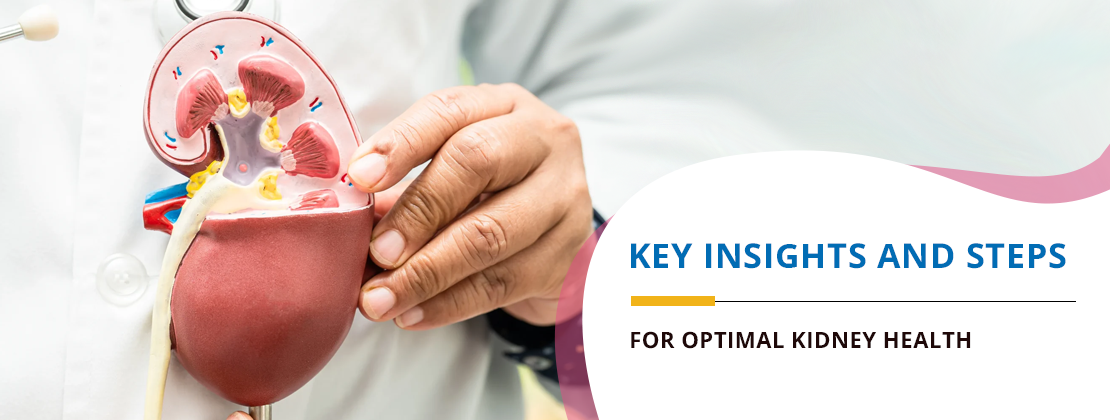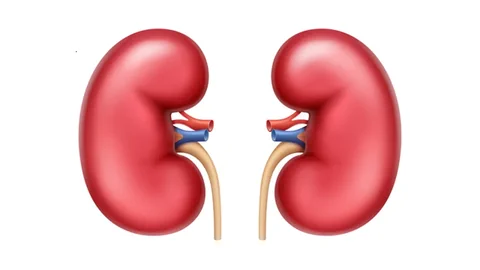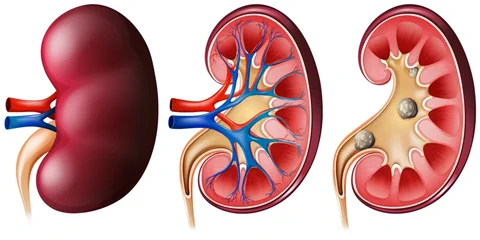
Home / Blog / Key Insights and Steps for Optimal Kidney Health
Kidney health is essential for overall well-being, yet its importance is often overshadowed until noticeable problems emerge. This comprehensive guide sheds light on the vital roles of the kidneys, highlighting the need for maintaining kidney health.
With the rising prevalence of kidney-related conditions, such as chronic kidney disease, kidney failure, and polycystic kidney disease, early detection and care are critical.
Understanding the varied symptoms of kidney diseases, and the subsequent necessity for potential interventions like kidney transplant or kidney stones treatment, are crucial steps in reducing health risks.
This guide aims to elevate awareness and knowledge about kidney health, highlighting the significance of timely medical responses to enhance life quality and health outcomes.
Various kidney diseases, including Chronic Kidney Disease (CKD), Polycystic Kidney Disease (PKD), diabetic kidney disease, and kidney stones can significantly impact health.
Diabetic kidney disease, a common complication of diabetes, increases the risk of kidney damage. Early recognition and diagnosis of these symptoms are vital for timely medical intervention and management of kidney disease.
These conditions can lead to the gradual loss of kidney function, with symptoms such as:
Understanding the symptoms and treatments of kidney diseases, such as kidney transplant surgery for end-stage renal disease or kidney stones treatment, is essential for preventing kidney failure and maintaining optimal health.

Untreated kidney conditions, such as chronic kidney disease, diabetic kidney disease, and polycystic kidney disease, can progressively worsen, leading to kidney failure, a critical state where the kidneys lose their ability to perform essential functions like filtering waste and balancing fluids.
The path to kidney failure is alarmingly common in India, where approximately 10% of the population suffers from Chronic Kidney Disease (CKD), leading to over one lakh cases of renal failure reported annually
Untreated conditions like diabetic kidney disease and polycystic kidney disease can worsen into kidney failure, a state where the kidneys fail to filter waste and balance fluids. This progression to end-stage renal disease (ESRD) necessitates dialysis or kidney transplant surgery.
Early detection and management of symptoms are vital to prevent such outcomes, highlighting the importance of regular health screenings and kidney function monitoring.
When kidneys are no longer able to function well on their own, treatment options like dialysis and kidney transplants become necessary. Here’s a detailed look at these treatments:
Both types require careful consideration of lifestyle impacts and risks, including infection.
HCG Suchirayu Hospital in Hubli specialises in kidney transplant surgery and offers a comprehensive care program for transplant recipients. This includes a thorough pre-surgery evaluation to determine transplant eligibility, followed by meticulous post-operative care to ensure the patient’s recovery and the transplant’s success.
The management of kidney disease is a multifaceted process that begins with a thorough diagnosis and extends through personalised treatment plans to ensure the patient’s well-being.
Living well after a kidney transplant means carefully following a new health routine. This starts with taking your medications exactly as your doctor prescribes.
Preventing Kidney Stones and diseases involves adopting a healthy lifestyle and making informed choices about your health. Here are effective strategies to help reduce the risk:

Achieving optimal kidney health is pivotal for a fulfilling and healthy life. Early detection and effective management of kidney diseases, including chronic kidney disease, diabetic kidney disease, and polycystic kidney disease, are vital.
Comprehensive understanding and utilisation of treatments like kidney stones treatment, dialysis, and kidney transplant surgery are essential.
Regular health check-ups, adherence to prescribed treatments, and lifestyle modifications play a significant role in preventing kidney disease progression and ensuring the success of interventions like kidney transplants.
HCG Hospitals’ Nephrology Department specialises in diagnosing and treating various kidney diseases, including chronic kidney disease, acute kidney injury, and kidney stones. We offer a range of treatments from medications and lifestyle changes to advanced options like dialysis and kidney transplantation.
Our facilities feature the latest technology for comprehensive kidney care. Our Nephrology department emphasises early detection and management of kidney conditions.
For expert care in kidney health, visit HCG Hospitals and consult with our nephrology specialists to safeguard your kidney function and overall well-being.
Signs include fatigue, swelling, changes in urination, and blood pressure fluctuations.
Kidney disease can be caused by conditions like diabetes, high blood pressure, chronic inflammation, and polycystic kidney disease.
Dialysis is a treatment that filters and purifies the blood using a machine when the kidneys can’t do it.
A small tissue sample is taken from the kidney to diagnose the specific type of kidney disease.
Management includes controlling blood sugar levels, blood pressure, and sometimes medication or dialysis.
Kidney function is tested through blood and urine tests that measure levels of waste products and filtering capacity.
Treatments include medication, lifestyle changes, dialysis, and kidney transplants.
Treatments range from pain management and drinking fluids to medical procedures like lithotripsy.
Kidney stones can lead to kidney disease if they cause ongoing urinary tract obstructions or infections
While there’s no cure for chronic kidney disease, early detection and treatment can slow its progression and manage symptoms.